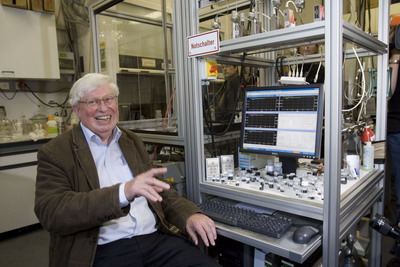German wins Nobel chemistry prize on his birthday
Updated: 2007-10-11 14:26
STOCKHOLM -- Gerhard Ertl of Germany won the 2007 Nobel Prize in chemistry Wednesday for studies of chemical reactions on solid surfaces, which are key to understanding questions such as how pollution eats away at the Earth's ozone layer.
 German scientist Gerhard Ertl poses in a laboratory in Berlin October 10, 2007. Ertl won the 2007 Nobel Prize for chemistry for his surface chemistry work, the Nobel chemistry panel at the Swedish Academy of Sciences said on October 10, 2007. The coveted 10 million Swedish crown ($1.54 million) award recognised his studies on chemical processes on solid surfaces. [Agencies] |
Ertl's research laid the foundation of modern surface chemistry, which has helped explain how fuel cells produce energy without pollution, how catalytic converters clean up car exhaust and even why iron rusts, the Royal Swedish Academy of Sciences said.
His work has paved the way for development of cleaner energy sources and will guide the development of fuel cells, says Astrid Graslund, secretary of the Nobel Committee for Chemistry.
"Knowledge about chemical reactions on surfaces will also help us produce renewable fuels more efficiently and create new materials for electronics," the academy said in a statement.
Ertl, who won the prize on his 71st birthday, told reporters it "is the best birthday present that you can give to somebody."
"I am speechless," Ertl said from his office in Berlin. "I was not counting on this."
Ertl is an emeritus professor at the Fritz Haber Institute of the Max Planck Society in Berlin. Planck and Haber were themselves Nobel laureates; they won the physics and chemistry prizes in 1918.
The academy said Ertl provided a detailed description of how chemical reactions take place on surfaces and studied some of the most fundamental mysteries in that field.
Ertl showed how to obtain reliable results in this area of research, and his findings applied in both academic studies and industrial development, the academy said.
"Surface chemistry can even explain the destruction of the ozone layer, as vital steps in the reaction actually take place on the surfaces of small crystals of ice in the stratosphere," the award citation said.
Surface chemistry is not glamorous, but Catherine Hunt, president of the American Chemical Society, says it has "transformed lives in so many ways."
"Research in surface chemistry already has underpinned innovations ranging from air pollution control technology to modern electronics products," Hunt said in a statement.
Americans Mario Capecchi and Oliver Smithies and Briton Sir Martin Evans won the 2007 Nobel Prize in medicine on Monday for groundbreaking discoveries that led to a powerful technique for manipulating mouse genes.
On Tuesday, France's Albert Fert and German Peter Gruenberg won the physics award for discovering a phenomenon that lets computers and digital music players store reams of data on ever-shrinking hard disks.
German Chancellor Angela Merkel congratulated both German winners. "I am very happy that this year we managed to get the Nobel prizes in both disciplines: physics and chemistry," she said. "This is a special honor."
Prizes for literature, peace and economics will be announced through Monday.
The awards, each of which is worth $1.5 million, will be handed out by Sweden's King Carl XVI Gustaf at a ceremony in Stockholm on December 10.
|
|
|
||
|
||
|
|
|
|